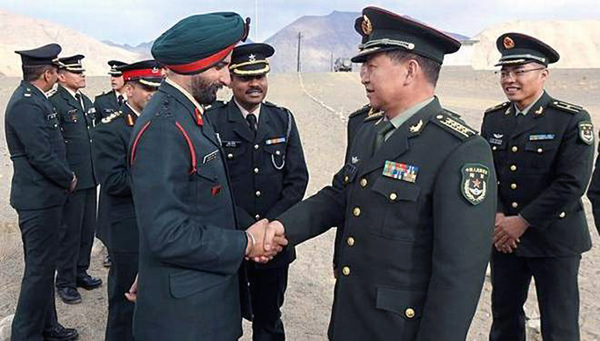After starting courses in Tibetology for officers posted along the Line of Actual Control (LAC) with China, the Army is now looking to introduce courses in negotiating tactics to better orient them during bilateral military level negotiations. The move comes in the backdrop of series military to military interactions on the ground since the standoff in Eastern Ladakh in May last year.
“Negotiation technique courses are in conceptual stage,” a defence source said stating that the finer modalities are being worked out.
Referring to Chinese negotiating tactics, a second source said that they try to drag on and wear out the other side during talks, a common observation by several officers in the know. “There is now greater effort to sensitize the rank and file on the ground on negotiation tactics,” the source stated.
Concurrently, the number of Chinese language interpreters in the Army has also gone up on the ground with interpreters now increasingly part of patrols where needed, according to officials on the ground.
Since May 2020, the two sides have been holding regular military to military talks on the ground in addition to the 13 rounds of Corps Commander level talks to resolve the standoff in Eastern Ladakh. For instance, since May 2020 and up to the 12th round of Corps Commander talks on July 31 this year, the two sides have held 10 Major General level talks, 55 Brigadier level talks and around 1,450 calls over the established two hotlines. India and China have two hotlines for communication at Chushul and Daulat Beg Oldi (DBO) in Eastern Ladakh.
Similarly in the Eastern sector, there are four Hot Lines, including the one added very recently, as part of measures to maintain peace and tranquillity on the LAC.
There are nine Border Personnel Meetings (BPM) held between the countries every year on ceremonial occasions till before the pandemic. Five of these are held on the Indian side and four on the Chinese side, said Maj Lovish Gupta during a recent visit to Bumla.
On the Indian side they are held on January 26 Republic Day, April 14 being Baisakhi, May 30 to mark the day when BPM’s began at Bumla in 1990, August 15 on Independence Day and on Diwali. On Chinese side they are held on January 1 new year, August 1 which is the raising day of People’s Liberation Army (PLA), October 1 coinciding with the day China declared Independence in 1949 and October 30 when BPM’s started on Chinese side in 1991. “Flag meetings are held as and when required between the two sides,” Maj Gupta added.
There have been 51 BPMs on the Indian side at Bumla since 1990 and 49 BPMs on the Chinese side since the point was set up on their side since July 16, 1991, another officer on the ground said.
At Bumla, the last BPM was held on January 2020 before the COVID pandemic. This year, three flag meetings were held till October end, the officer added.
The Army, with a view to orient its officers and men posted along the LAC in Tibetan culture and also prepare them to better understand information warfare, has begun a course in Tibetology and the first batch with 15 participants was held from March to June this year. Around 150 officers have been trained so far across the country.
In Eastern Ladakh, the two sides have completed disengagement at Galwan, Pangong Tso and Gogra areas, and Hot Springs, Demchok and Depsang are yet to be resolved. The 13th round of Corps Commander talks remained inconclusive with the two sides releasing sharp statements on the outcome. Following another round of diplomatic level talks the two sides are now preparing to hold the 14th round of Corps Commander level talks soon.


















